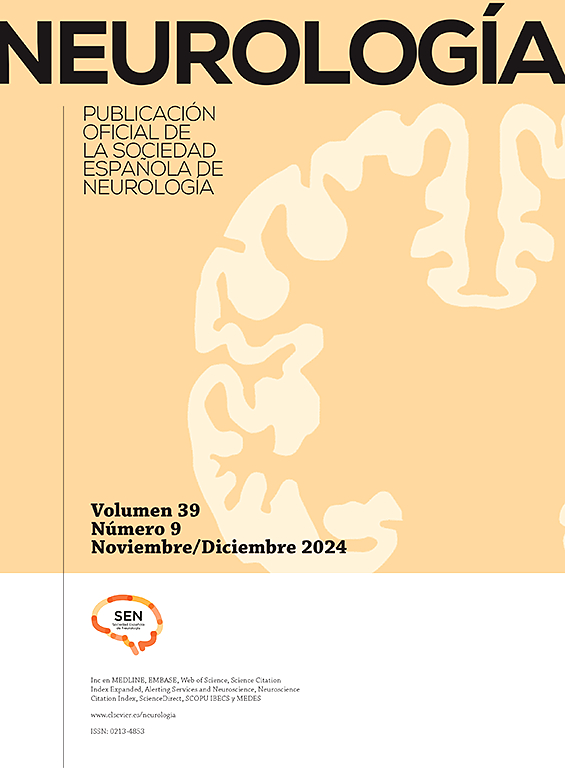Adherencia al tratamiento en pacientes con esclerosis múltiple: factores de riesgo
IF 3.1
4区 医学
Q2 CLINICAL NEUROLOGY
引用次数: 0
Abstract
Introduction
Adherence is a modifiable factor to disease-modifying treatments response in patients with multiple sclerosis (MS). Our objective is to assess the risk factors associated with inadequate adherence.
Method
Retrospective study through review of medical records and review of the database of pharmaceutical dispensing of patients with MS of a tertiary hospital from 2004 to 2022. A multivariate logistic regression analysis of demographic, clinical, nosological, and therapeutic factors was performed between adherent and non-adherent patients and treatments.
Result
546 treatments of 284 patients (67.3% women, age 38.4 ± 10.0 years) were analyzed, observing 87.5% adherence. Non-adherent patients presented a higher EDSS at the end of treatment, were more frequently patients with secondary progressive multiple sclerosis, and had a higher proportion of cognitive impairment, psychiatric pathology, polypharmacy, and alcohol and drug use. After the multivariable analysis, risk factors were cognitive impairment (OR: 3.82 [1.51-9.70], P = .005), and alcohol and drug use (OR: 22.83 [7.32-71.20], P < .001). On the contrary, oral drugs favored better adherence (OR: 0.29 [0.12-0.75], P = .01).
Conclusions
Among many factors, alcohol or drug use and cognitive impairment are the major risk factors for low therapeutic adherence in patients with MS.
多发性硬化症患者坚持治疗:危险因素
依从性是多发性硬化症(MS)患者改善疾病治疗反应的一个可改变因素。我们的目的是评估与依从性不足相关的危险因素。方法通过查阅某三级医院2004 - 2022年MS患者的病历资料和调剂数据库进行回顾性研究。在坚持治疗和不坚持治疗的患者之间进行人口统计学、临床、分类学和治疗因素的多因素logistic回归分析。结果共分析284例患者546例治疗方案,其中女性67.3%,年龄38.4±10.0岁,依从性87.5%。非依从性患者在治疗结束时出现更高的EDSS,更多的是继发性进行性多发性硬化症患者,并且认知障碍、精神病理、多种药物、酒精和药物使用的比例更高。多变量分析后,危险因素为认知障碍(OR: 3.82 [1.51-9.70], P = 0.005)、酒精和药物使用(OR: 22.83 [7.32-71.20], P <;措施)。相反,口服药物的依从性更好(OR: 0.29 [0.12-0.75], P = 0.01)。结论在诸多因素中,酒精或药物使用和认知功能障碍是MS患者治疗依从性低的主要危险因素。
本文章由计算机程序翻译,如有差异,请以英文原文为准。
求助全文
约1分钟内获得全文
求助全文
来源期刊

Neurologia
医学-临床神经学
CiteScore
5.90
自引率
2.60%
发文量
135
审稿时长
48 days
期刊介绍:
Neurología es la revista oficial de la Sociedad Española de Neurología y publica, desde 1986 contribuciones científicas en el campo de la neurología clínica y experimental. Los contenidos de Neurología abarcan desde la neuroepidemiología, la clínica neurológica, la gestión y asistencia neurológica y la terapéutica, a la investigación básica en neurociencias aplicada a la neurología. Las áreas temáticas de la revistas incluyen la neurologia infantil, la neuropsicología, la neurorehabilitación y la neurogeriatría. Los artículos publicados en Neurología siguen un proceso de revisión por doble ciego a fin de que los trabajos sean seleccionados atendiendo a su calidad, originalidad e interés y así estén sometidos a un proceso de mejora. El formato de artículos incluye Editoriales, Originales, Revisiones y Cartas al Editor, Neurología es el vehículo de información científica de reconocida calidad en profesionales interesados en la neurología que utilizan el español, como demuestra su inclusión en los más prestigiosos y selectivos índices bibliográficos del mundo.
 求助内容:
求助内容: 应助结果提醒方式:
应助结果提醒方式:


